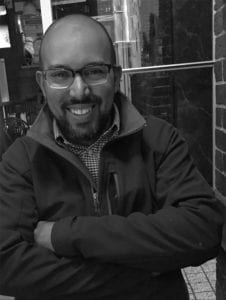Published: Wednesday, October 16, 2019, 9:30 a.m. U.S. Central Time
Media Contact: Ann Klinck, 301.634.7342, press@ashg.org
Findings Reported at ASHG 2019 Annual Meeting
 HOUSTON, Texas – Researchers are increasingly prioritizing the need for diversity in genetics and genomics research. To help make such studies more inclusive, José G. Pérez-Ramos, MPH and Timothy D.V. Dye, PhD, research scientists at the University of Rochester examined Hispanic and Latinx populations’ desire to participate in genomics research. Mr. Pérez-Ramos presented the findings at the American Society of Human Genetics (ASHG) 2019 Annual Meeting in Houston, Texas.
HOUSTON, Texas – Researchers are increasingly prioritizing the need for diversity in genetics and genomics research. To help make such studies more inclusive, José G. Pérez-Ramos, MPH and Timothy D.V. Dye, PhD, research scientists at the University of Rochester examined Hispanic and Latinx populations’ desire to participate in genomics research. Mr. Pérez-Ramos presented the findings at the American Society of Human Genetics (ASHG) 2019 Annual Meeting in Houston, Texas.
“We were interested in the determinants for people to participate in genetic research,” said Dr. Dye, principal investigator on the study. “Not only is representation in research important for accuracy of results, but it also helps improve distributional justice. If Hispanic and Latinx people are not represented, then there’s no possibility of them benefitting from all of the important genetics research that’s happening.”
Mr. Pérez-Ramos and colleagues surveyed 1,718 individuals from 69 countries, among whom 251 participants self-identified as Hispanic or Latin American and Caribbean (LAC). When measured as a single group, Hispanic and LAC people were as willing to participate in genomics research studies, and felt as positively about their impact, as other groups. However, when the participants of Hispanic and LAC ancestry were segmented further by country of birth and residence, there were noticeable differences in attitudes toward and interest in genetic research participation.
The researchers studied survey responses among Hispanic and Latinx people born in LAC countries who still lived there; Hispanic and Latinx people born in LAC countries who migrated elsewhere (mostly to the United States); and people of Hispanic and Latinx ancestry who were born and lived outside of LAC (mostly in the U.S.). In answering whether they would participate in a genetic research study, 70% of Hispanic and Latinx people who still lived in LAC reported that they were likely to participate, while 53% of those who had moved out of LAC would participate. Only 46% of those who self-identified as ethnically Hispanic or Latinx but were born and lived in non-LAC countries would participate.
“It’s impossible to say right now why there are these disparities for the Hispanic and Latinx populations,” said Mr. Pérez-Ramos. “What can be drawn from this survey is that Latinx people living outside LAC countries are less likely to participate in genetics research and have less trust in researchers. There need to be conscious efforts to make genetics research more representative, especially in the United States, where Hispanic and Latinx people are the largest minority population.”
According to Dr. Dye, it is vital to have diversity not only among research participants, but among researchers. “A community-oriented approach, where genetics and genomics researchers engage with the communities being studied and take the time to understand what is important to them, helps make this research successful,” he said. “It is also helpful to have at least one person in the research group who speaks the language and can provide cultural relevance.”
Mr. Pérez-Ramos and Dr. Dye are hoping to further this research by investigating why different populations may trust or mistrust researchers and choose whether to participate in studies. For example, in Puerto Rico, where researchers have committed abuses toward the Puerto Rican community in the past, there is a poor connection between the community and science that has likely inhibited trust.
“Among the countries we studied, there are lots of differences in views of and past experiences with the research enterprise,” said Dr. Dye. “It’s important for researchers to engage with and understand what is important to each community, and to treat participants equitably when offering and implementing genetics research opportunities.”
Media Interest: To learn more about Mr. Pérez-Ramos’s work or set up an interview, please contact press@ashg.org to coordinate.
Reference: Pérez-Ramos JG, Dye TD, Fernandez ID, Velez Vega C, Vega Ocasio D, Avendaño E, Cardona Cordero N, Di Mare Herring C, Quiñones Tavarez Z, Dozier A, Groth S. Variation in intention to participate in genetic research among Hispanic/Latinx populations by Latin America birth-residency concurrence: A global study. American Society for Human Genetics Annual Meeting, Houston, Texas.
About the American Society of Human Genetics (ASHG)
Founded in 1948, the American Society of Human Genetics is the primary professional membership organization for human genetics specialists worldwide. Its nearly 8,000 members include researchers, academicians, clinicians, laboratory practice professionals, genetic counselors, nurses, and others with an interest in human genetics. The Society serves scientists, health professionals, and the public by providing forums to: (1) share research results through the ASHG Annual Meeting and in The American Journal of Human Genetics; (2) advance genetic research by advocating for research support; (3) educate current and future genetics professionals, health care providers, advocates, policymakers, educators, students, and the public about all aspects of human genetics; and (4) promote genetic services and support responsible social and scientific policies. For more information, visit: http://new.ashg.org.
6120 Executive Blvd, Suite 500 | Rockville, MD 20852 | 301.634.7300 | society@ashg.org | new.ashg.org
Connect with ASHG on Twitter (@GeneticsSociety) | Facebook | LinkedIn
